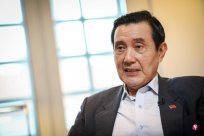After the outbreak of the Russian and Ukraine War, the situation of the Taiwan Strait continued to heat up, but this year, it seemed to have signs of gradually slowing down.According to the analysis of Taiwanese scholars, the officials on both sides of the strait have seen the problems that they need to make up from the experience of the Russia and Ukraine War, so they re -adjusted their pace.
Looking back in the past year, in addition to the turbulence of the world situation in the Ukrainian war, Perlis, the former Speaker of the House of Representatives in the United States, visited Taiwan last August. Beijing has raised its military instability in Taiwan, which has also attracted worldwide attention.
However, with the unsealation of epidemic prevention, officials on both sides of the strait have recently released signals that are willing to resume exchanges, which has also slowed down the situation in the Taiwan Strait.
The Russian and Ukraine War was one of the full anniversary of the full Friday (February 24). The Taiwan National Policy Research Institute held a symposium on the same day to invite experts and scholars to discuss the Russian and Ukraine War with the International and Cross -Strait Change.Dong Liwen, a member of the Taiwan think tank consulting committee, proposed at the meeting that the experience of the Russian and Ukraine War, in addition to highlighting the importance of Taiwan's global geopolitical strategic position, and closely affecting the cross -strait changes, also allowed the cross -strait governmentsWhat is worried.
He said that Taiwan has fully recognized the lack of self -defense capabilities and tried to catch up. Russia's failure in war, the United States mobilization and the preparation of Taiwan have also made the mainland's "cautious theory of Wu Tong", "strategic strategy", "strategic strategy""Break up again.
Dong Liwen believes that Beijing is re -adjusting the steps and methods of promoting Taiwan's promotion, which will focus more on the united front of different groups in Taiwan to construct a discourse of "reaching the unity of cross -strait democratic negotiation".
The PLA reduces the deterrent strength of Taiwan
Ma Zhenkun, a professor at the Institute of Military Affairs of the CPC Military Affairs of the Taiwan National Defense University who also attended the symposium, pointed out that in the past year, the mainland's military pressure on Taiwan's military pressure has risen, but so far, the frequency of military ships in the surrounding sea and airspace around Taiwan has declined significantly. RecentlyLarge -scale activities are a response to senior officials in the United States.
He believes that this is the strategic guidance of the PLA's cooperation with the Central Committee of the Communist Party of China from Taiwan, from tough to ease, reducing the intensity of military deterrence against Taiwan.This also shows that the Chinese Communist Party's military means on Taiwan still belong to the "curb war" stage of Taiwan ’s independence and opposition to external interference, rather than wanting to“ solve the problem of Taiwan ’s issues with force to achieve unity of cross -strait issues with force.
But Ma Zhenkun emphasized that this does not mean that the mainland has abandoned military containment against Taiwan.
If the new variables that have obviously passed the Red Line of Beijing, the situation of the Taiwan Strait may turn sharply again. The intensity of the mainland's military deterrence against Taiwan will be more intense than the previous stage.


